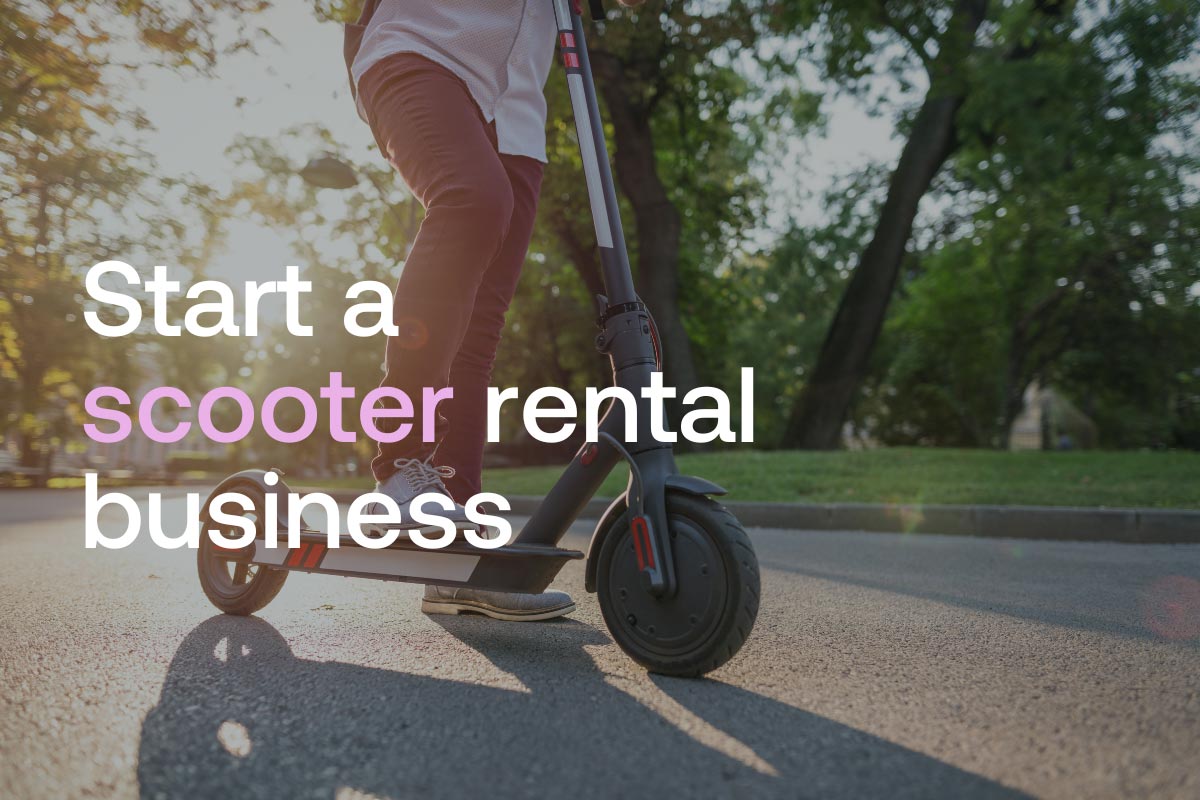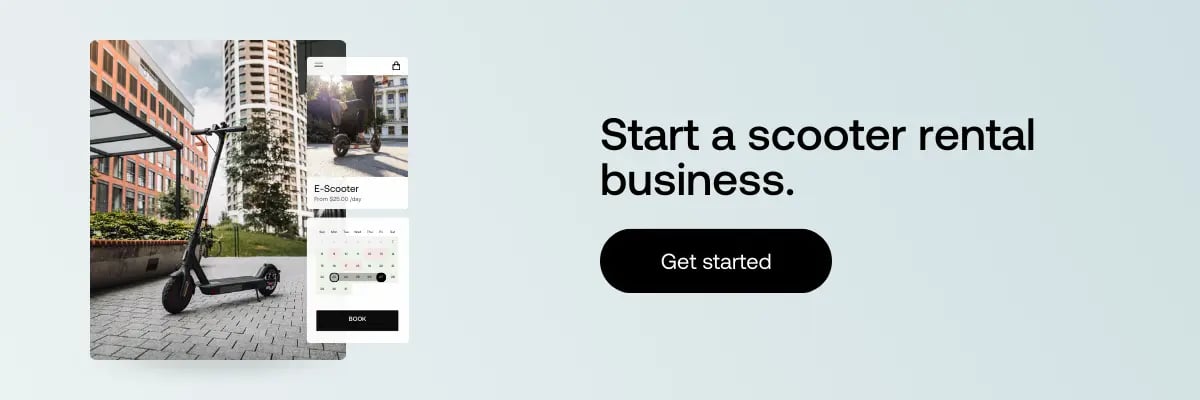If you've visited any bigger city in the last few years, you can't have missed the appearance of electric scooters on the streets. The race for market share among electric scooter platforms has been so aggressive that it has not been entirely without problems and side effects. When scooters are parked in the wrong places and driven recklessly, it is no wonder that some people resent the existence of scooters.
But that being said, the world is changing, and as urban populations grow, so does the demand for alternative, eco-friendly, and efficient transportation options. There is no denying that e-scooters are a very convenient form of transport.
E-scooter rental businesses are emerging as a popular solution to address these needs, offering a convenient and enjoyable way to explore cities, commute to work, or simply enjoy a leisurely ride. While the scooter-sharing business is a particularly competitive (and heavily financed) market, especially in large cities, smaller companies have the opportunity to differentiate themselves with a value proposition and business model. In addition, smaller businesses are better placed to operate in smaller market areas due to a more flexible cost structure.
So, if you're an entrepreneur looking to make a positive impact while tapping into a growing market, starting a scooter rental service could be the perfect opportunity for you. In this comprehensive guide, we will cover the key steps and considerations involved in launching a scooter rental business. From market research and business planning to daily operations and managing rental contracts, we will provide actionable insights and best practices that can help you successfully launch and grow your own scooter rental business. Our aim is to equip you with a clear understanding of the challenges and opportunities in the scooter rental market, as well as the steps needed to get started and build a profitable business.
Now, let's dive into the essential steps for starting a scooter rental business.
Create a scooter rental business plan
A solid business plan is the foundation of any successful venture. It not only serves as a roadmap for your scooter rental business but also helps you secure funding from investors or financial institutions. A comprehensive business plan consists of several sections that look at your company's eligibility from external and internal perspectives.
Next, we'll go through the essentials of market and competitor analysis, followed by business and operations planning.
Market research and competitor analysis
Before diving headfirst into the scooter rental industry, it's crucial to understand the market landscape, your target audience, and the competition.
Identify your target audience
Start by identifying your primary customer segments. These could include tourists, local commuters, or college students. Understanding your target audience's needs and preferences will help you tailor your services, pricing, and marketing strategies.
Perform a competitor analysis
Research your local competitors to determine their strengths and weaknesses. Identify any gaps in the market or opportunities to differentiate your scooter rental business from the competition.
As we mentioned earlier, the rise of scooter-sharing platforms has created an extremely competitive market, especially around daily modes of transport, making market entry extremely expensive and, in some cities, almost impossible.
In contrast, alternative rental models, such as a monthly subscription model, may well work and do not require millions in funding to get started. Another competitive advantage that smaller operators have over more established players is localism, especially in smaller cities where it does not make sense for larger players to enter for unit cost reasons.
Evaluate the seasonality
Consider the seasonality of your business, as demand for scooter rentals may vary throughout the year. Factor in peak seasons and potential slow periods when forecasting annual revenue, planning finances, and developing marketing strategies.
Business planning
With a clear understanding of the market and competition, it's time to define your business objectives, model, and financial projections.
Before moving into explaining the meaning and purpose of value props and business models, here are a few potentially viable scooter rental business ideas for a seed of thought.
-
E-scooter subscription business: This model caters to individuals who frequently use e-scooters for their daily commute but seek more convenience, personalization, and cost-effectiveness than what is typically provided by shared platforms. With a fixed monthly subscription, customers will have exclusive access to their own e-scooter, negating the need to search for available scooters or share them with other users.
This service provides added value to users by ensuring availability and consistent quality and could include benefits such as regular maintenance, insurance, and even the option to upgrade or swap models.
-
Scooter rentals as a side venture: Scooter rentals make an excellent opportunity for existing businesses, including hotels, guesthouses, and bike rental companies, to create an additional income stream and enhance the overall customer experience. By offering scooter rentals, you can cater to guests or customers who seek convenient modes of transportation for exploring the local area or for short-distance travel.
-
Scooter tours and experiences business: Tourism-focused activity providers can offer scooter tours if the environment provides safe conditions for scooting. By merging the thrill of riding a scooter with the enriching experience of a guided tour, you can target tourists looking to explore local attractions, historical landmarks, or scenic routes in a fun and environmentally-friendly way. Scooter tours combine tourism and e-mobility, offering an immersive and engaging way for people to discover and appreciate a destination while enjoying the excitement of riding a scooter.
Define your value proposition
A value proposition is what sets your scooter rental business apart from the competition. This could include offering unique scooter models, exceptional customer service, or competitive pricing. Clearly articulate your value proposition to attract and retain customers.
Your value proposition should be closely linked to your identified target audience and their needs. While tourists, for example, may be interested in short-term rentals and guided tours, local commuters are unlikely to resonate.
So, tailor your value proposition to your target audience and dare to stand out.
Describe your business model
Outline your business model, including how you plan to generate revenue, pricing strategies, and any additional services you may offer, such as guided tours or maintenance services.
As has been said many times, building your own e-scooter rental app was a good idea maybe five years ago, but today you're helplessly late as most of the market share is more or less shared. Think about your business model in terms of what these services cannot currently deliver. For example, the monthly subscription model may appeal to consumers for whom the pay-per-use model does not work.
Project your finances
You need to make an initial investment to get a scooter rental business rolling. To understand how much it costs to start a scooter rental business, how many orders you need to make a profit, and how long it takes to pay back your initial investment, you have to develop a financial plan. Below we list some of the most important expenses to consider.
Startup costs include:
-
Scooter fleet
-
Equipment and accessories
-
Rental facility setup
-
Website development
-
Marketing materials
-
Legal and accounting services
-
Permits and licenses
-
Software and other business tools
The startup costs will vary depending on factors such as the size of your fleet, the location of your rental facility, and whether or not you hire staff to help you. It's essential to carefully (and realistically!) estimate these expenses before making any moves.
To get an idea of whether your business has the potential to make a profit, it's time to look at the operational costs. Operational costs can be categorized into fixed costs and variable costs. Let's see what these are.
Fixed costs are expenses that remain relatively consistent regardless of the volume of business activity. These costs typically include:
-
Rent or mortgage
-
Insurance premiums
-
Salaries and wages
-
Utilities
-
Marketing and advertising
-
Website maintenance
-
Business tools and software
-
Professional services
Variable costs are expenses that fluctuate based on the volume of business activity or the number of customers. These costs typically include:
-
Scooter maintenance and repairs
-
Equipment replacement
-
Credit card processing fees
-
Seasonal marketing efforts
It's crucial to regularly monitor both fixed and variable costs to maintain a healthy cash flow and ensure the profitability of your scooter rental business. By analyzing your ongoing expenses, you can identify areas for cost reduction and make informed decisions to optimize your scooter business operations.
Create a marketing plan
A comprehensive marketing plan outlining your target audience, branding, and promotional strategies is an essential part of your business plan and go-to-market strategy. Consider both online and offline channels to reach potential customers effectively.
Develop an operations plan
Outline the daily operations of your scooter rental business, including inventory management, employee roles, and customer service procedures. A process chart will help you understand the steps to consider when renting a scooter.
If you haven't skipped any steps, at this point, you should have a thorough business plan in place, and you can confidently move forward with establishing the legal and organizational aspects of your scooter rental business.
Establish a legal entity for your scooter rental business
To operate your scooter rental business legally and protect your personal assets, you'll need to establish a business entity and take care of some essential administrative tasks.
Choose a name for your business
Select a unique and memorable name for your scooter rental business that reflects your brand identity and value proposition. Make sure the name is available by checking local business registries and securing a domain name for your business website.
Form a business entity
Choose the most suitable business structure for your scooter rental business, such as a sole proprietorship, partnership, or limited liability company (LLC). Consult with a legal professional or accountant to determine the best option for your specific needs.
-
Sole Proprietorship: Straightforward to set up with only a social security number. However, it doesn't offer liability protection in the event of lawsuits or debts. Additionally, you'll need to pay taxes on both your personal and business income.
-
Partnership: Partnerships have many similarities to sole proprietorships, but they are a good choice if you want to go into business with someone else. They have the same tax and liability drawbacks, plus you're liable for your partner's misconduct.
-
LLC (Limited Liability Company): Limited Liability Company, aka LLC, protects your assets from liability or legal claims. What's more, it also provides pass-through taxation.
Overall, an LLC is probably your best choice here. They are easy to form, limit your personal liability for losses, and, unlike a C Corp, you can pass through your taxes. While they are a little more complex to set up, an LLC saves you on tax and protects your personal assets in the event of debts or lawsuits.
Register for taxes
Once again, registering a company for taxes differs from country to country but typically is a fairly simple procedure. In the US, you have to apply for an Employer Identification Number (EIN) and register your business for federal and state taxes. This step is crucial for staying compliant with tax regulations and avoiding penalties.
Set up a business bank account
Opening a dedicated business bank account to keep your personal and business finances separate is essential and makes it easier to manage your cash flow and prepare your tax returns. Opening a business account also allows you to start building credit, access business loans, and get a company credit card, which can help with cash flow.
Legal and regulatory considerations for scooter rentals
Before you can begin operating your scooter rental business, you must obtain the necessary permits, licenses, and insurance coverage.
Permits and licenses
Check local, state, and federal regulations to determine which permits and licenses your scooter rental business will need. These may include a general business license, zoning permits, and any special licenses related to operating a vehicle rental business.
Insurance coverage
Obtain appropriate insurance coverage to protect your business and assets from potential risks. We recommended talking to a professional insurance agent, but in general, the common business insurance includes:
-
General liability insurance: General liability insurance is an excellent catch-all policy. It protects your business from covered losses, including bodily harm and damage to property.
-
Business property insurance: This type of insurance insures your equipment and assets from damage.
-
Worker's compensation insurance: Protects your employees from injury on the job.
-
Auto insurance: Protects your vehicle if an accident or breakdown occurs.
There are also other types of insurance and insurance packages specifically aimed at small business owners, which a professional insurance agent can tell you more about.
Rental contract and waiver policies
Draft a clear and comprehensive rental contract outlining terms and conditions for customers. Because scooting involves a risk of injury, it is important to include a liability waiver to protect your business from legal claims arising from accidents or injuries involving your rental scooters.
For many, the legal matters are the most tedious part of starting a business but when taken care of, you can sleep much more soundly as an entrepreneur, knowing that you are protected against the risks.
Once your legal and regulatory aspects are in place, you can move on to setting up your rental facility, managing inventory, and planning your marketing efforts.
Finding the right location and facility
Selecting the right location and setting up a functional, customer-friendly rental facility is crucial for the success of your scooter rental business, especially if your business depends on high customer volumes.
Here are some important factors to consider when choosing a location and designing your facility.
Choose your business location wisely
The location of your scooter rental business can significantly impact your visibility, foot traffic, and overall success. When selecting a location, consider the following:
-
Your business model: How nice and shiny you need your premises depends on your business model and your target audience. If you're targeting locals and renting scooters for longer periods, you can operate a little further away from the crowds and still find success. This will save you on costs but increases the importance of online presence and marketing. On the other hand, if your business plan is based on accessibility and foot traffic, the location and attractiveness of your premises are everything.
-
Price: The more central the location, the higher the prices. Pretty obvious, but the fixed costs of your business make a big difference in how easy it is to turn a business into a profit.
-
Proximity to popular tourist attractions, shopping areas, or transportation hubs: A strategic location near these areas can attract more walk-in customers and make it easier for them to access your services.
-
Local competition: Ensure there's sufficient demand in the area to support your scooter rental business without being overshadowed by established competitors. The electric scooter rental market is extremely competitive, especially in larger cities. So think carefully about what you have to offer your local market.
-
Parking and accessibility: Easy and convenient access improves the overall customer experience, which is why you should choose a location with enough space for parking and storage of scooters without disturbing other traffic. Naturally more challenging in central areas than on the outskirts.
-
Safety and regulations: Ensure the area is safe for scooter riders and complies with local regulations regarding scooter usage on streets and sidewalks.
Design and setup your store
A well-designed rental facility not only helps streamline your operations but also creates a welcoming environment for customers. Here are some things you should think about when planning your premises.
-
Customer experience: Create a user-friendly layout with a clear rental process and visible pricing. Ensure the facility is clean, well-lit, and inviting, making customers feel comfortable and secure.
-
Storage and maintenance: Allocate sufficient space for storing, charging, and maintaining your scooters. Implementing an organized system for tracking inventory and performing regular maintenance checks is essential to keep your fleet in optimal condition.
-
Security measures: To protect your scooters and other assets from theft or vandalism, consider installing a security camera and alarm system. Moreover, using GPS tracking devices on scooters can help you monitor their location and deter misuse. Just make sure that you respect the privacy of your customers and that they are aware that the location of the scooters is tracked.
-
Signage and branding: Display eye-catching signage and branding elements that communicate your value proposition and create a memorable impression on customers.
By carefully considering location and facility design, you can create a strong foundation for your scooter rental business that not only attracts customers but also supports efficient operations.
Inventory management
Maintaining a well-organized inventory of scooters and equipment is essential for smooth daily operations and customer satisfaction. From sourcing to managing your scooter fleet effectively, there are a few things to know.
Sourcing scooters and equipment
When purchasing scooters for your fleet, consider factors such as durability, ease of use, and maintenance requirements. Partner with reliable manufacturers and suppliers that offer quality products and after-sales support, and aim for long-term partnerships. In addition to scooters, invest in essential equipment such as helmets, locks, and chargers.
Tips for maintaining and organizing inventory
Proper rental inventory management helps you keep track of your assets, plan for maintenance, and ensure customer satisfaction. We strongly recommend using software designed for rental businesses.
You should schedule regular checks and routine maintenance for each scooter to ensure they remain safe and functional. This includes checking tire pressure, brakes, and battery life. Using an inventory management system or software to track your scooter fleet and its usage is a tremendous help for monitoring maintenance schedules and identifying patterns in scooter usage.
Moreover, you should develop an organized storage system that allows you to easily locate and access scooters, making the rental process more efficient. Cleanliness and tidiness are not just about improving operational efficiency but also about improving safety at work.
By focusing on inventory management, you can provide a reliable and enjoyable experience for your customers while also minimizing downtime and maximizing the usage and lifespan of your scooters. In the rental business, that's money.
Marketing and customer acquisition
Attracting and retaining customers is essential for the success of your scooter rental business. Here's how to implement effective marketing strategies to build your brand and grow your customer base.
Identifying your target market
As you've already identified your target audience during market research, you can now create customer profiles or personas that represent your ideal customers. These personas will help you tailor your communication, marketing messages, and channels to resonate with your target audience.
Build a memorable brand for your business
Develop a consistent and memorable brand identity that reflects your value proposition and appeals to your target audience. Elements of your brand identity include your business name, logo, color scheme, and tone of voice. Ensure that all marketing materials and communications align with your brand identity to create a cohesive image in the minds of your customers.
Effective marketing strategies for a scooter company
There’s only so much one can do with limited resources. However, by focusing on the right things, even a small investment can yield good returns. A well-working playbook for small consumer businesses creatively combines online and offline channels. Here are a few cost-effective examples:
-
Online advertising: Use targeted ads on search engines and social media platforms to reach potential customers who are searching for scooter rentals or related services.
-
Online reviews: Invest in getting user reviews right from the start. Google reviews are of paramount importance to local businesses, as they are one of the most important ranking factors in local search engine optimization. Tripadvisor and other and other tourism-related platforms are important for tourism-dependent businesses. Other relevant review platforms include, for example, Trustpilot.
-
Local partnerships: Collaborate with local hotels, restaurants, and tourist attractions to offer special promotions or referral incentives.
-
Content marketing: Create engaging blog posts, videos, and social media content that shares helpful tips and provides answers to your customers' typical questions. Content marketing is a long game, but investing in quality content will build your brand, audience, and community for the long term. The results may be slim at first, but once you reach a tipping point, it'll be one of the most effective marketing strategies.
-
Offline advertising: There are many cost-effective ways to utilize traditional marketing tactics to build brand awareness. The most obvious one is to have branded labels or other recognizable features applied to your scooters. Using the same logic, you can make your physical location more eye-catching. This way, you can make your brand more visible to local people. There are numerous other tactics you can try out, such as distributing flyers, posters, or brochures in strategic locations, i.e. tourist information centers, cafes, and transportation hubs.
The role of a website and online user experience in driving sales
A professional, user-friendly website is essential for showcasing your scooter rental services, attracting customers, and facilitating online reservations. In our guide, we go through how to create a rental website step-by-step.
Optimize your website for search engines (SEO) to increase visibility and drive organic traffic. Ensure your website is easy to navigate, mobile-responsive, and provides clear information on pricing, rental terms, and location details.
To improve conversion rates, you should also implement a smooth online booking system that allows customers to reserve and rent scooters, and make payments with ease. Using scooter rental software like Twice, you seamlessly integrate your sales channels with your inventory management system. This means that you and the customer browsing your website always have real-time information about available rental scooters.
Together with a comprehensive marketing plan, a user-friendly website is an extremely effective sales channel for acquiring new customers, driving sales, and growing your scooter rental business.
Operations and customer service
Smooth operations and exceptional customer service are key to building a loyal customer base and maintaining a positive reputation in the industry.
Managing daily operations
Well-defined and thoughtfully planned processes for daily tasks, such as opening and closing procedures, order checkouts and returns, and inventory management, not only help work more efficiently but also translates into better customer service.
We can not highlight the importance of internal documentation enough. Even though you'd be running the business solo, the documentation process will help you to see the bigger picture better. And, of course, when you add a workforce, onboarding them will go many times faster if you have the "house rules" written down.
Delivering excellent customer service
Successful customer service teams know how to reinforce positive experiences and mitigate negative ones.
Outstanding customer service creates memorable experiences and thus encourages repeat business. Train your staff to be knowledgeable, friendly, and responsive to customer inquiries and concerns. Ask for customer feedback and address any issues promptly, demonstrating your commitment to customer satisfaction.
Well-oiled operations and great customer service provide you e scooter business with a solid foundation on which you can build a growing business. Next, let's move on to growing your scooter rental business.
Growth and expansion
Once your scooter rental business is up and running, it's essential to create a habit of measuring performance, identifying areas for improvement, and continuously executing growth strategies.
Key Performance Indicators to monitor
Every business should define Key Performance Indicators (KPIs) relevant to their business. Otherwise, it is impossible to know where your business stands, set measurable goals, and steer it in the right direction. Typically a business has one main KPI — the Northstar metric, and different departments have their own set of KPIs more relevant to a particular function. A scooter rental business's KPIs could include:
-
Number of rentals
-
Revenue growth
-
Customer acquisition cost
-
Customer retention rate
-
NPS score
-
Customer reviews (amount and rating)
Strategies for growing the business
There are various growth strategies you can explore to expand your scooter rental business and increase profitability. Try, for example:
-
Adding new services: Additional services, such as guided scooter tours, maintenance services, or selling scooter accessories, can potentially generate new revenue streams.
-
Expanding your fleet: Investing in more scooters or diversifying your offerings with different models or electric bikes can offer a path to growth by catering to a broader customer base.
-
Opening new locations: Research potential markets and open additional rental facilities in high-demand but low-competition areas, increasing your visibility and reach.
-
Improving marketing efforts: Continuously refine your marketing strategies based on performance data, and invest in new marketing channels to attract more customers.
Potential challenges and how to overcome them
As your scooter rental business grows, it will likely come with its share of challenges. By anticipating these obstacles, you can develop solutions to overcome them and ensure sustainable growth.
One of the main challenges new scooter startups face is the aggressive competition and expansion of scooter-sharing platforms. This makes larger cities unattractive markets for smaller players unless a clear niche is identified. Your value proposition must be in some way significantly different from what these skateboard companies offer. Perhaps you can lease scooters on a subscription basis and build a loyal customer base of users who live outside of the scooter-sharing platforms' service range.
Another issue to tackle is the regulatory changes. The rapid increase in the use of scooters has not made all citizens happy, partly because the lack of regulation means that the behavior and indifference of scooter users are constantly leading to dangerous situations and general disorder. So, stay informed about changes in local regulations and adapt your business practices accordingly. You should also encourage responsible usage and safety, as well as engage with local authorities and advocate for scooter-friendly policies.
Finally, in many parts of the world, scooter rentals are seasonal due to the climate. Therefore, you need to plan for seasonal changes in demand and adjust your marketing strategies and budget accordingly. During slow periods, explore alternative revenue streams or prepare to cut down costs.
Conclusion
Starting a scooter rental business can be a rewarding venture that combines your passion for eco-friendly transportation with the opportunity to build a thriving business. By following the guidance in this comprehensive guide, you'll be well-equipped to navigate the challenges and opportunities in the scooter rental industry. With careful planning, strategic marketing, and a focus on exceptional customer service, you can successfully launch and grow a profitable scooter rental business.










